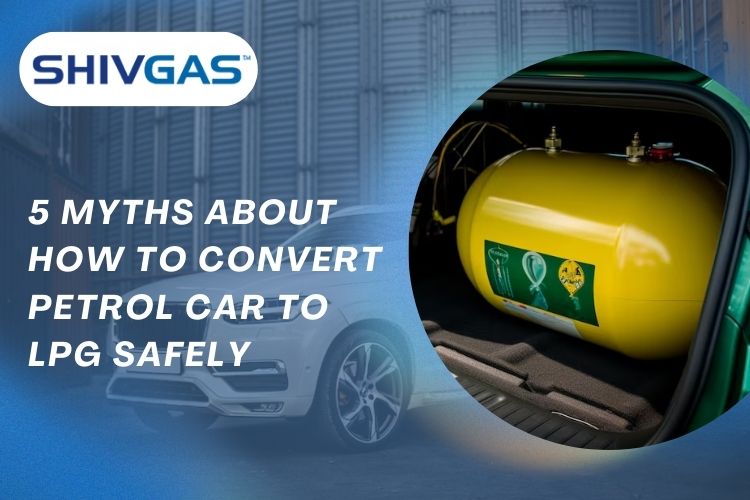
In this age of ever-increasing inflation, it is perhaps more important than ever to save up. Everyone is increasingly doing their best to become self-sufficient and sustainable. Thus the focus on saving up financially, environmentally and socially is possibly the most. This is a tremendous need of all sectors but especially for automobiles. One of the very commonplace areas of improvement when it comes to becoming more cost-effective and sustainable is taking a stand between LPG and petrol. Thus, not just vehicle owners but also manufacturers are trying to convert petrol car to LPG.
Liquefied petroleum gas like many other fuels that have been in use for a long, is a traditional one. Known for its convenience, eco-friendliness and most importantly cost-effectiveness, LPG beats all other fuels like diesel, petrol, coal, natural gas, electricity etc, thus now emerging as a really handy choice for all kinds of 2-wheelers, 4 wheelers & more. Now, establishing itself as the go-to fuel over the likes of petrol and diesel, LPG is the number one option for generating power across all kinds of automotives such as even light-duty, medium-duty and heavy-duty trucks and tractors. This is a clear indicator that LPG for 2 wheelers can be super efficient too. Below stated are 5 key myth busters that you should acutely know if you are interested to convert petrol car to LPG.
Liquefied Petroleum Gas due to its advanced fuel injection, clean burning, minimal knocking and low wear and tear is compatible with all kinds of engines across all sorts of vehicles- starting from light weight two wheelers to heavy duty trucks. Thus, the operations are way smoother than what they are when it comes to petrol. Made out of propane, butane, propylene, butylene, and isobutane, liquefied petroleum gas’ versatility, high calorific value, and precise and uniform heating capability makes it the number ones for all automobile engines unequivocally.
LPG installation in automotives is one of the easiest. LPG’s high octane rating is something that is unmatched even with Petrol. Thus, LPG gas is capable of improved engine efficiency and smoother operations. LPG-powered automotives are way less prone to be at the receiving end of your maintenance efforts. It reduces expenses as well as provides efficiency. LPG through its high energy output, efficiency and low cost achieves the ultimate goal of the business and consumer. Making life easier and more livable, LPG optimises your needs the way nobody does with utmost precision, efficiency and most importantly, cost-effectiveness. While petrol vehicles can still be seen in urban areas, its off-grid usage is very low unlike LPG. Used to meet off grid needs in multiple ways, LPG Gas is a comprehensive and most importantly reliable automotive solution for those too who are cut off from the mainstream city world.
Optimising operations, maximising profits and leaving a very minimal carbon footprint, LPG is a clear winner when it comes to environmental consciousness. The greenhouse gas emissions of LPG are one of the lowest. LPG produces extremely low carbon dioxide and nitrogen oxide particulates while on the other hand, the carbon dioxide emissions of petrol are extremely high. Making life easier and more livable, LPG optimises your needs the way nobody does with utmost precision, efficiency and most importantly, cost-effectiveness. Petrol vehicles on the other hand don’t provide a power output that is as high as LPG. Thus, even a slight reduction in power compared to not just LPG but also petrol can often be encountered in petrol using vehicles.
LPG is one of the safest fuels that you can get your hands on. LPG is now everyone’s go-to choice for ensuring continuous and reliable performance. A preference for all, LPG, due to its precise temperature control, supplies heat evenly and immediately for all automobile purposes better than not just petrol but also other solid fossil fuels. This is a major safety plus that LPG has over other fuels like petrol for automotives. Certified with the best standards and safety protocols from national and internationally acclaimed institutions, it is a no-brainer for all those who want to convert petrol cars to LPG.
LPG stations are no longer a rarity. LPG pumps are now becoming increasingly common in India not just in the urban areas but in rural areas too. Thus, although petrol stations are more easily available than LPG ones, LPG charging pumps are a booming phenomenon that does not hinder vehicle owners or LPG suppliers of cars.
Thus, a fuel that optimizes operations, maximizes profits and leaves a very minimal carbon footprint on the environment has been the lookout of every sector for a long time. The calorific value of LPG is 55000 kJ/kg. It means it produces 55000-kilo joule energy by burning 1 kg of it. This is exceptionally high. Due to this high heat liberation capacity, the performance of LPG compared to other fuels is much superior. Not only does this allow LPG to provide energy faster, it ensures high performance for a long period of time. Thus, the benefits of PG conversion are plenty for those who are looking to convert petrol car to LPG. This is a huge reason why all major industries and not just automobiles prefer LPG as their go-to fuel. You might be under the assumption that due to being armed with so many features, the cost of LPG is incredibly high. But that is absolutely not the case. Cheaper than its counterpart conventional fuels like petrol, it allows businesses of all kinds to optimize their operations by cutting down on fuel expenditure. The most economically viable option, LPG is now available across the whole country and the world through competitive pricing and flexible supply options.
Comment (0)